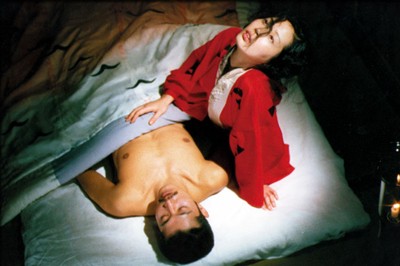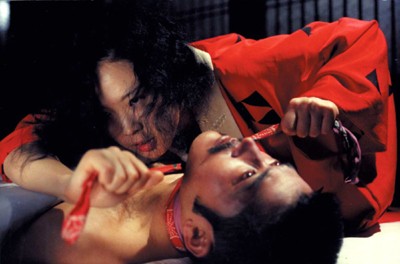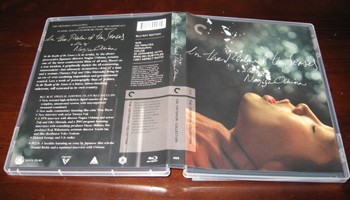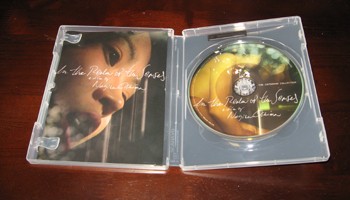| Reviews & Columns |
|
Reviews DVD TV on DVD Blu-ray 4K UHD International DVDs In Theaters Reviews by Studio Video Games Features Collector Series DVDs Easter Egg Database Interviews DVD Talk Radio Feature Articles Columns Anime Talk DVD Savant Horror DVDs The M.O.D. Squad Art House HD Talk Silent DVD
|
DVD Talk Forum |
|
|
| Resources |
|
DVD Price Search Customer Service #'s RCE Info Links |
|
Columns
|
|
|
In the Realm of the Senses - Criterion Collection
The Criterion Collection // Unrated // April 28, 2009
List Price: $39.95 [Buy now and save at Amazon]
The Film:
The term "experimental film" can refer to many things. It can mean a collage of images thrown together to try and invoke a reaction, or it can be a filmmaker's stab at telling a story not often told. Few avant-garde pictures like these are as deeply unsettling and boundary-breaking as In the Realm of the Senses (also known as Empire of Senses, or L'empire des sens), a work of true water-testing from acclaimed Japanese filmmaker Nagisa Oshima. Containing lengthy expanses of graphic, real sexual intercourse and an overall sense of erotic obsession, it's a true test on the nerves that grows exponentially more difficult to absorb with the viewer's closed-mindedness. However, once you've become desensitized to its garishness, the dynamic power struggle between the two leads builds into a compelling exercise in sensory conditioning and gender etiquette deconstruction -- all engulfed in an erotic tone that lingers long afterwards.
Largely a visual work and light on plot, In the Realm of the Senses tells the true story of Sada Abe (Eiko Matsuda), a folk hero of sorts in Japan for her obsessive relationship with a married man. It starts as a casual affair between her, a servant, and her employer, an energetic and sex-driven man with near endless libido, which transforms as Sada Abe's true nature seeps into the picture. She's now taken on an iconic presence in Japan, hinged on the events that take place once the two start to dive deeper into their relationship. As Sada Abe explains her "acute sensitivity" to her lover and builds an obsession with his genitalia, the two begin to explore some of the darker recesses of sexuality -- namely violence and asphyxiation. This level of intensity has etched a place for it in cinematic history as one of the more controversial stories to be caught on film, proven by its French co-production title since Nagisa Oshima couldn't show it uncensored in his native Japan due to its graphic nature.
From their first sexual encounter, Oshima makes it clear that he doesn't plan on turning heads away from their encounters. The exact opposite, actually; he carries firm belief in the concept of breaking taboos by forcing one's self to witness that which they fear, in a sense, which builds In the Realm of the Senses into a very difficult film to watch. He knows, without a doubt, that he's likely going to unsettle most people that watch the film, which happens to be his aim. The film is probably the most widely-known example of "experimental erotica", as it forces their incensed and obsessive sexuality into our line of sight in never-ending lengths of oral and full-blown sex. It remains, however, oddly intoxicating from start to finish -- not because of its capacity for arousal, but more for the way that it tinkers with the audience's mind and allows core emotionality to pour through while watching their torrid affair.
Eventually, the sights and sounds of their carnal relationship begin to contort into an oddly idyllic playground for their obsession. It's also the time that the couple has grown accustomed to the current state of their consuming relationship -- and takes their relationship a step further. Determined film-watchers will take that step with them, which flows right along with what Nagisa Oshima desires with In the Realm of the Senses. Every inch that we take further into their "realm" means another one that cannot be taken backwards, denting and construing the perception that we hold for their acts. It exemplifies the term: "what has been seen cannot be unseen". In most cases, that's used in a negative connotation. In Oshima's eyes, it's a way of evolving his audience's social perception by bombarding them with visually stunning images -- ones that remain, from start to finish, highly human in nature.
What separates In the Realm of the Senses from being strictly erotica, aside from the splendid cinematography, is the instinctive and fluid nature of the actors' performances. Let's not even address their non-simulated intercourse here, but their dramatic abilities. Both Eiko Matsuda and Tatsuya Fuji carry a surprisingly natural rhythm, one heightened by their experience and their roles in the relationship. Sada Abe is feral and dominant by nature, which could easily be overplayed by a seasoned actress. This happens to be Yoshiyuki Kazuko's first role, one of only a few that she'd participate in before disappearing into Europe. Her lack of theatrical "poise" giver Sada Abe a tangible presence, one that feels surprisingly real. Tatsuya Fuji plays off of her untamed nature exceedingly well as the recessive element in their relationship, containing his masculinity in a way that harnesses both temerity and surrender. Their interplay remains involving and, in some instances, humorous in an array of very dark manners.
Whether In the Realm of the Senses is obscene, artistic, or somewhere in between is all subjective, but it's undeniably both a challenge and a significant marker of defiance in the world of Japanese cinema at the time. Nagisa Oshima thrives on taking his audience a step further than they're comfortable in going, which makes it a literal eye-widening experience. After witnessing the conclusion of Sada Abe's dangerous obsession, it's near impossible to shake these images from the mind. Few films actually match with the statement "you've got to see it to believe it", but this is certainly one of those films. Whether you'll want to see it again, however, is another personal decision. To say the least, In the Realm of the Senses is a compelling and well-performed portrait of sexual fixation and relationship power structure -- and an important film for experimental filmmaking, as it truly tests the boundaries separating taboo from normalcy.
The Blu-ray:
Criterion, in a move that'll hopefully satisfy critics of its previous Blu-ray presentations, have opted for a new, clear case for this new wave of Blu-rays (along with Wages of Fear. It's a bit thicker than the standard U.S. Blu-ray, though it'll seem familiar if you've purchased an import Blu-ray or HD-DVD from the United Kingdom. Overall, in regards to stability of the packaging, replacement of artwork and such, this is a much more feasible and attractive offering -- and that's coming from someone who enjoyed the original designs. Enclosed is a beefy Booklet that contains a lengthy, thorough essay from Donald Richie and a 1976 interview with Nasiga Oshima from Japanese publication "Image Forum".
Video and Audio:
No matter how you feel about the material being displayed on-screen, it'd be near impossible not to be overwhelmed by the incredible work Criterion have put into restoring In the Realm of the Senses. Presented in its original 1.66:1 aspect ratio by way of a potent 1080p AVC encode, the marriage between natural film presence and incredibly life-like texture come together splendidly here. A subtle veil of film grain comes draped across the image, never approaching anything beyond the film texture present in 35mm source interpositive that it was pulled from. The grain and shadows can grow a little unstable in one or two darker scenes, but those are exceedingly few and far between.
Plenty of the "wow" factor crops up in the image, notably in the exquisite presentation of skin tones heavily present in ... well, just about every single shot. Contrast is handled extremely well, while the colors really leap from the screen in grand fashion. It's a very colorful film, filled with lush colors from across the rainbow to uphold an artistically pleasing presence. Minor details stay incredibly sharp, from petals on trees and falling snowflakes to the granules in wood textures, while showcasing no signs of edge enhancement or unsightly noise reduction anywhere in the print. As with Chungking Express and El Norte, it's not the most demo-worthy Blu-ray out there -- but the way it displays the material can take your breath away on more than one occasion.
Matching the strong video is an exceptional Linear PCM Mono track, one that boasts clarity that rivals that of elements recorded on modern equipment. In truth, very little of In the Realm of the Senses' age can be heard in this track. Verbal clarity remains exceptionally crisp, while the atmospheric score intermingles well with the other sound elements in a natural balance. Some older tracks have a problem of pushing on the upper shelf to some rather raspy levels, even with strong mixes, yet not a single bit of distortion could be pulled out of this audio track. Subtitles, as per Criterion's standard procedure, are only available in optional English.
Special Features:
Audio Commentary with film critic Tony Rayns:
Staying centered on the subtext and political elements -- with a dash of discussion regarding sex -- Tony Rayns keeps a very stiff tone that a commentary about a semi-pornographic film should have. He remains insightful, discussing the actors' experiences before and after the film as well as the political stance that it took. He also goes on to elaborate on visual motifs and, even, a small hunt of discussion on dominance structure during the more intense scene, even though he tries to clarify that he won't discuss such things at the start of the commentary. As per Criterion's standards, they've picked the right man for this job.
Interviews:
Three interviews are available, one featuring Oshima and his Cast (5:38, AVC) in a 1976 archive piece, one featuring Tatsuya Fuji (17:18, AVC), and a third entitled "Recalling the Film" (38:48, AVC) that brings together crew members and distributors alike. The first features Nagisa Oshima with Eiko Matsuda and Tatsuya Fuji in a question/answer session. Oshima is inquired about the state of pornography in Japan, while Eiko Matsuda receives some attention regarding her role. Tatsuya Fuki's lengthy interview dives much deeper into the film, discussing flower imagery, his sexual scenes as being "uncharted territory", and his overall experience working with the "polite" director.
Also available is an American Theatrical Trailer (AVC), the same one available on Criterion's website for the film, and an array of Deleted Scenes (12:20) that encompass around six (6) minutes of deleted material framed inside the shots that made it into the film. The deleted material is presented in color, while the bits included in the film are in grayscale.
Final Thoughts:
Though sexuall graphic and hard to digest, it's difficult not to reflect on In the Realm of the Senses for a long period of time after an initial screening. In between -- and in the midst -- of the sexual content, a veil of humanity can be clearly seen in this true depiction of Sada Ade's all-consuming love affair with a married man. More than that, it marks a point when Nagisa Oshima took a stance against cinema norms, cultural confinements, and political beliefs with a picture injected with subtle imagery interwoven into its "hard-core" pornographic nature. It builds into a compelling picture that knows it's pushing its audience to the brink.
Whether or not you should own In the Realm of the Senses is a difficult decision to make, as the return value largely depends on your perception of the material's nature -- which isn't something that can really be decided until you've seen it yourself. Still, with the outstanding visual and aural treatment from Criterion, as well as a nice slate of extras that include a stellar commentary and a new interview with Tatsuya Fuji, Nagisa Oshima's film comes with a timid Recommendation for most viewers. However, if you've seen the film and have built your stance on its content, then don't hesitate on purchasing this glorious high-definition presentation.
Thomas Spurlin, Staff Reviewer -- DVDTalk Reviews | Personal Blog/Site
 |
Largely a visual work and light on plot, In the Realm of the Senses tells the true story of Sada Abe (Eiko Matsuda), a folk hero of sorts in Japan for her obsessive relationship with a married man. It starts as a casual affair between her, a servant, and her employer, an energetic and sex-driven man with near endless libido, which transforms as Sada Abe's true nature seeps into the picture. She's now taken on an iconic presence in Japan, hinged on the events that take place once the two start to dive deeper into their relationship. As Sada Abe explains her "acute sensitivity" to her lover and builds an obsession with his genitalia, the two begin to explore some of the darker recesses of sexuality -- namely violence and asphyxiation. This level of intensity has etched a place for it in cinematic history as one of the more controversial stories to be caught on film, proven by its French co-production title since Nagisa Oshima couldn't show it uncensored in his native Japan due to its graphic nature.
From their first sexual encounter, Oshima makes it clear that he doesn't plan on turning heads away from their encounters. The exact opposite, actually; he carries firm belief in the concept of breaking taboos by forcing one's self to witness that which they fear, in a sense, which builds In the Realm of the Senses into a very difficult film to watch. He knows, without a doubt, that he's likely going to unsettle most people that watch the film, which happens to be his aim. The film is probably the most widely-known example of "experimental erotica", as it forces their incensed and obsessive sexuality into our line of sight in never-ending lengths of oral and full-blown sex. It remains, however, oddly intoxicating from start to finish -- not because of its capacity for arousal, but more for the way that it tinkers with the audience's mind and allows core emotionality to pour through while watching their torrid affair.
Eventually, the sights and sounds of their carnal relationship begin to contort into an oddly idyllic playground for their obsession. It's also the time that the couple has grown accustomed to the current state of their consuming relationship -- and takes their relationship a step further. Determined film-watchers will take that step with them, which flows right along with what Nagisa Oshima desires with In the Realm of the Senses. Every inch that we take further into their "realm" means another one that cannot be taken backwards, denting and construing the perception that we hold for their acts. It exemplifies the term: "what has been seen cannot be unseen". In most cases, that's used in a negative connotation. In Oshima's eyes, it's a way of evolving his audience's social perception by bombarding them with visually stunning images -- ones that remain, from start to finish, highly human in nature.
 |
Whether In the Realm of the Senses is obscene, artistic, or somewhere in between is all subjective, but it's undeniably both a challenge and a significant marker of defiance in the world of Japanese cinema at the time. Nagisa Oshima thrives on taking his audience a step further than they're comfortable in going, which makes it a literal eye-widening experience. After witnessing the conclusion of Sada Abe's dangerous obsession, it's near impossible to shake these images from the mind. Few films actually match with the statement "you've got to see it to believe it", but this is certainly one of those films. Whether you'll want to see it again, however, is another personal decision. To say the least, In the Realm of the Senses is a compelling and well-performed portrait of sexual fixation and relationship power structure -- and an important film for experimental filmmaking, as it truly tests the boundaries separating taboo from normalcy.
The Blu-ray:
 |  |
Criterion, in a move that'll hopefully satisfy critics of its previous Blu-ray presentations, have opted for a new, clear case for this new wave of Blu-rays (along with Wages of Fear. It's a bit thicker than the standard U.S. Blu-ray, though it'll seem familiar if you've purchased an import Blu-ray or HD-DVD from the United Kingdom. Overall, in regards to stability of the packaging, replacement of artwork and such, this is a much more feasible and attractive offering -- and that's coming from someone who enjoyed the original designs. Enclosed is a beefy Booklet that contains a lengthy, thorough essay from Donald Richie and a 1976 interview with Nasiga Oshima from Japanese publication "Image Forum".
Video and Audio:
No matter how you feel about the material being displayed on-screen, it'd be near impossible not to be overwhelmed by the incredible work Criterion have put into restoring In the Realm of the Senses. Presented in its original 1.66:1 aspect ratio by way of a potent 1080p AVC encode, the marriage between natural film presence and incredibly life-like texture come together splendidly here. A subtle veil of film grain comes draped across the image, never approaching anything beyond the film texture present in 35mm source interpositive that it was pulled from. The grain and shadows can grow a little unstable in one or two darker scenes, but those are exceedingly few and far between.
Plenty of the "wow" factor crops up in the image, notably in the exquisite presentation of skin tones heavily present in ... well, just about every single shot. Contrast is handled extremely well, while the colors really leap from the screen in grand fashion. It's a very colorful film, filled with lush colors from across the rainbow to uphold an artistically pleasing presence. Minor details stay incredibly sharp, from petals on trees and falling snowflakes to the granules in wood textures, while showcasing no signs of edge enhancement or unsightly noise reduction anywhere in the print. As with Chungking Express and El Norte, it's not the most demo-worthy Blu-ray out there -- but the way it displays the material can take your breath away on more than one occasion.
Matching the strong video is an exceptional Linear PCM Mono track, one that boasts clarity that rivals that of elements recorded on modern equipment. In truth, very little of In the Realm of the Senses' age can be heard in this track. Verbal clarity remains exceptionally crisp, while the atmospheric score intermingles well with the other sound elements in a natural balance. Some older tracks have a problem of pushing on the upper shelf to some rather raspy levels, even with strong mixes, yet not a single bit of distortion could be pulled out of this audio track. Subtitles, as per Criterion's standard procedure, are only available in optional English.
Special Features:
Audio Commentary with film critic Tony Rayns:
Staying centered on the subtext and political elements -- with a dash of discussion regarding sex -- Tony Rayns keeps a very stiff tone that a commentary about a semi-pornographic film should have. He remains insightful, discussing the actors' experiences before and after the film as well as the political stance that it took. He also goes on to elaborate on visual motifs and, even, a small hunt of discussion on dominance structure during the more intense scene, even though he tries to clarify that he won't discuss such things at the start of the commentary. As per Criterion's standards, they've picked the right man for this job.
Interviews:
Three interviews are available, one featuring Oshima and his Cast (5:38, AVC) in a 1976 archive piece, one featuring Tatsuya Fuji (17:18, AVC), and a third entitled "Recalling the Film" (38:48, AVC) that brings together crew members and distributors alike. The first features Nagisa Oshima with Eiko Matsuda and Tatsuya Fuji in a question/answer session. Oshima is inquired about the state of pornography in Japan, while Eiko Matsuda receives some attention regarding her role. Tatsuya Fuki's lengthy interview dives much deeper into the film, discussing flower imagery, his sexual scenes as being "uncharted territory", and his overall experience working with the "polite" director.
Also available is an American Theatrical Trailer (AVC), the same one available on Criterion's website for the film, and an array of Deleted Scenes (12:20) that encompass around six (6) minutes of deleted material framed inside the shots that made it into the film. The deleted material is presented in color, while the bits included in the film are in grayscale.
Final Thoughts:
Though sexuall graphic and hard to digest, it's difficult not to reflect on In the Realm of the Senses for a long period of time after an initial screening. In between -- and in the midst -- of the sexual content, a veil of humanity can be clearly seen in this true depiction of Sada Ade's all-consuming love affair with a married man. More than that, it marks a point when Nagisa Oshima took a stance against cinema norms, cultural confinements, and political beliefs with a picture injected with subtle imagery interwoven into its "hard-core" pornographic nature. It builds into a compelling picture that knows it's pushing its audience to the brink.
Whether or not you should own In the Realm of the Senses is a difficult decision to make, as the return value largely depends on your perception of the material's nature -- which isn't something that can really be decided until you've seen it yourself. Still, with the outstanding visual and aural treatment from Criterion, as well as a nice slate of extras that include a stellar commentary and a new interview with Tatsuya Fuji, Nagisa Oshima's film comes with a timid Recommendation for most viewers. However, if you've seen the film and have built your stance on its content, then don't hesitate on purchasing this glorious high-definition presentation.
|
| Popular Reviews |
| Sponsored Links |
|
|
| Sponsored Links |
|
|
| Release List | Reviews | Shop | Newsletter | Forum | DVD Giveaways | Blu-Ray | Advertise |
|
Copyright 2024 DVDTalk.com All Rights Reserved. Legal Info, Privacy Policy, Terms of Use,
Manage Preferences,
Your Privacy Choices | |||||||














